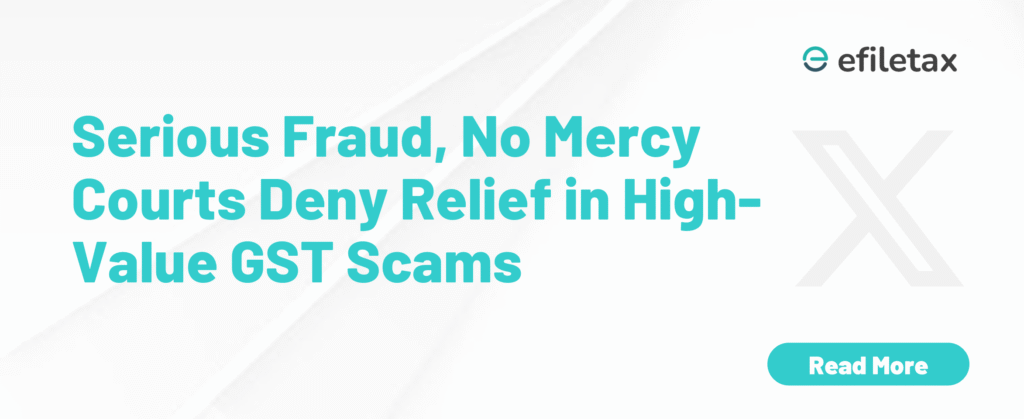
No Relief in High Value Fraudulent Transactions What Taxpayers Must Know
If you’re involved in high value fraudulent transactions, the Indian courts are clear — no relief will be granted in the face of serious tax fraud allegations. From the Income Tax Department’s aggressive scrutiny to recent High Court rulings, the law is taking a zero-tolerance stance on such matters.
Whether you’re a consultant, CA firm, or small business owner, here’s a simplified, expert-backed update on how the tax system views serious financial fraud.
Why No Relief Is Granted in High Value Fraudulent Transactions
The judiciary has repeatedly ruled that tax authorities are justified in denying relief when there’s prima facie evidence of fraud, especially involving:
- Bogus transactions or fake invoices
- Shell companies and fake directors
- Misuse of Input Tax Credit (ITC) under GST
- Unexplained cash credits under Section 68 of the Income Tax Act
- Benami transactions
Recent Judicial Take:
In XYZ Traders vs. Principal Commissioner of Income Tax, the High Court declined to grant interim relief, stating:
“When the allegation is serious and involves structured fraudulent behavior, the petitioner cannot claim relief as a matter of right.”
(Source: Delhi High Court Judgment Archives)
Legal Provisions Invoked in Fraud Cases
Here’s a quick look at the legal tools tax authorities and courts use:
| Legal Provision | Purpose |
|---|---|
| Sec 132 | Income Tax raid and search powers |
| Sec 68 | Unexplained cash credit |
| Sec 271AAC | Penalty on unexplained income |
| Sec 73/74 CGST Act | Recovery and penalty for ITC fraud |
| PMLA (Prevention of Money Laundering Act) | Where proceeds of crime are involved |
What Happens When Fraud Is Suspected?
If flagged for high value fraudulent transactions, expect the following:
- Search and seizure proceedings under Section 132/133A of the Income Tax Act.
- Show-cause notices with reversed ITC or disallowed expenses.
- Arrest provisions under GST in cases above ₹5 crore of evasion.
- No anticipatory bail in some serious fraud cases, as upheld by courts.
Key Case References
- [Supreme Court in P.V. Ramana Reddy (2019)]
→ Upheld arrest power under GST for ITC fraud even before adjudication. - [Madras HC in S. Kishore Kumar (2020)]
→ Denied bail for a taxpayer accused of massive fake invoicing. - [Delhi HC in MakeMyTrip Ltd. vs. UOI (2024)]
→ Clarified that input tax credit claimed through shell vendors amounts to wilful misstatement, not clerical error.
Expert View: Play Clean or Face Consequences
“Taxpayers should ensure real, document-backed transactions. If even one vendor is found bogus, the ITC chain collapses — and you could be liable under Section 74 CGST Act,” warns CA Nitin Bansal, Tax Advisor at Efiletax.
How to Stay Safe from Tax Fraud Allegations
- Avoid cash transactions above prescribed limits
- Verify GSTIN and PAN of vendors
- Keep a proper audit trail — invoices, delivery challans, bank proofs
- File accurate returns and reconcile GSTR-2B with GSTR-3B
Summary
Courts apply strict scrutiny in cases involving fake invoicing, shell companies, and ITC misuse. Legal provisions like Sec 132 of Income Tax Act and Sec 74 of CGST Act empower authorities to initiate arrests and attach assets.
FAQ Section
Q1: Can I get bail if accused of GST fraud?
A: Bail is not automatic. Courts assess the gravity of offence and evidence before granting relief.
Q2: Are all mismatches in GSTR-2B treated as fraud?
A: No. Clerical errors can be rectified, but using fake invoices or ghost vendors constitutes fraud.
Q3: What if I unknowingly dealt with a bogus vendor?
A: You must prove due diligence — KYC checks, bank transactions, delivery proofs.
Related Read from Efiletax
Input Tax Credit: Rules, Restrictions & Reversals in 2025
Facing GST or income tax notices?
Let Efiletax’s legal and tax experts help you respond correctly and avoid penalties.
👉 Contact us now for end-to-end support.